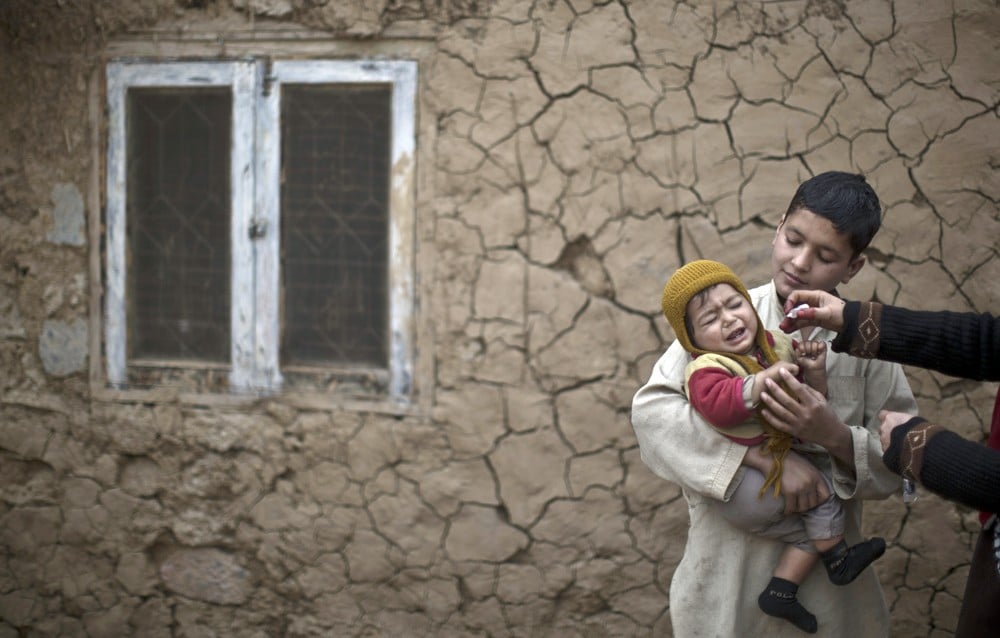
Even though statistics show a marked improvement, a recent media report says over 25,000 parents in 19 districts of the Khyber Pakhtunkhwa have refused administering polio drops to their children

Pakistan is faced with a number of challenges in eradicating polio from the country. Not only are cases being reported from all the four provinces and tribal areas, there are thousands of parents who are still not ready to vaccinate their children against the crippling disease.
Polio has become a serious issue for Pakistan as hectic efforts are underway to bring the number of cases to zero. At the same time, extraordinary security is to be arranged every time a vaccination teams steps out since they have become a prime target for terrorists over the last few years. The number of polio cases in Pakistan has dropped significantly over the last few months. There have aggressive campaigns launched by the provincial and federal government called Sehat Ka Insaf and Sehat Ka Ittehad.
A fresh three-day vaccination campaign was carried out all over KP and other parts of the country from September 14. The fourth day was for the follow up to visit those children who could not vaccinated. The total target of children for vaccination in the Khyber Pakhtunkhwa was 5,422,970 for which 17,135 polio teams and 3,496 area supervisors were engaged. KP senior minister for health Shahram Khan Tarakai inaugurated the campaign together with religious leader and chief of Jamiat Ulema-e-Islam-Sami, Maulana Samiullah Haq, in a bid to counter the propaganda of some religious elements against the polio drops.
In the past, the JUI-F chief Maulana Fazlur Rahman, ex chief of Jamat-e-Islami Qazi Hussain Ahmad and current chief Sirajul Haq kicked off such campaigns as part of creating awareness among the public that there is nothing un-Islamic in the vaccine. Several fatwas were issued in favour of the vaccination campaigns, making it clear there is nothing wrong with the drops.
The campaigns have reduced the number of polio cases in Pakistan to 32 during almost nine months of the current year as compared to 306 cased during the 12 months of 2014. Last year, 68 polio cases were reported in KP alone while 167 were reported in Fata. The cases reported during the current year is less than 20 per cent compared to the corresponding year.
But the job is still not done. There still are cases being reported and one of the major factors is that thousands of parents have been refusing to vaccinate their children against polio, not realising how they are harming their lives. The number of refusals in Khyber Pakhtunkhwa and Fata is higher than other parts of the country as both the areas are more conservative.
A recent media report quoted Dr Rahim Khattak, the incharge of Expanded Program on Immunization (EPI), as saying that 25,800 parents in 19 districts of the Khyber Pakhtunkhwa have refused administering polio drops to their children while 0.2 million other children could not be vaccinated as they were not available at home during the vaccination campaign. Around 4.2 million children under the age of 5 were successfully vaccinated.
The number of refusing parents was quite high till last year before the government decided to take action against the parents who were not voluntarily administering drops to their children. Over 400 were arrested alone in Peshawar while cases were lodged against over 1000 others who had refused to vaccinate their kids.
"There are 3,800 cases in Peshawar in which parents refused administering vaccine to their children during the recent campaign," says deputy commissioner Peshawar Riaz Khan Mehsud. He added that the number of such cases was over 16,000 during February. In March, the district administration of Peshawar and other districts lodged cases against the parents and arrested a number of them after which they assured to cooperate with the vaccination staff
"We are committed to bringing down the number of refusals to less than 1000 during the next campaign and to zero very soon. There is no compromise on the issue," adds Riaz Mehsud who has successfully run campaigns against encroachment as well as food outlets in the recent months.
The KP government and the reparative district administrations have already started to engage the newly elected nazims and councillors in the war against polio. The elected members have been asked to create awareness among the masses as well as convince the parents refusing to vaccinate their children that there is neither anything un-Islamic in the vaccine nor it will cause impotency to them. They also assisted the police in ensuring security for the vaccination teams.
"We were told by the local bosses of police to keep an eye and make sure that nothing untoward happens to the polio workers. I visited my constituency throughout the campaign. Those vaccinating kids are our mothers, sisters and daughters and we will facilitate them in eradicating polio from our country," says Malik Nazir Mohammad, nazim of a suburban neighbourhood council in Town-IV Peshawar.
In the past, a number of polio workers, supervisors and even those providing them security were targeted by the terrorists and made headlines in the international and national media. There were a number of occasions when the vehicles transporting polio vaccinators or security personnel guarding them came under bomb attacks, forcing many parents to stop sending their daughters to their job.
The situation now seems to have improved as not only the attacks have reduced but the parents too are now allowing their daughters to take active part in vaccination campaigns. The number of parents refusing to vaccinate their children is also on decline but still there are tribal agencies as well as remote districts and towns of KP where awareness campaigns need to be launched to bring down the number of cases as well as refusal by the parents to zero.